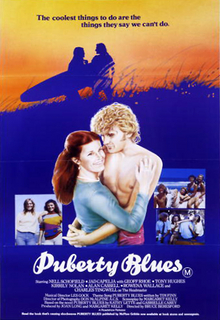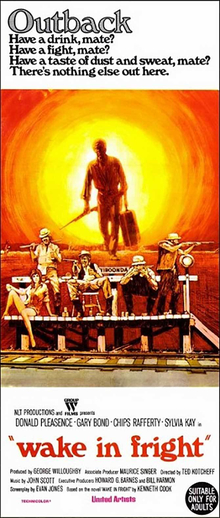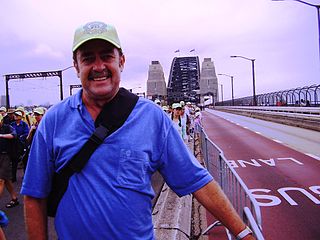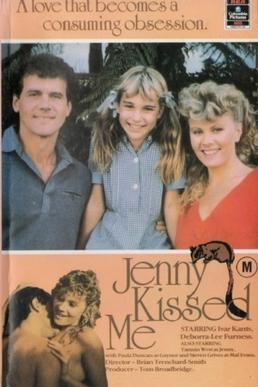Related Research Articles

David James Stratton is an English-Australian film critic and historian. He has also worked as a journalist, interviewer, educator, television personality, and producer. His career as a film critic, writer, and educator in Australia spanned 57 years, until his retirement in December 2023.
Daryl Paul Somers is an Australian television personality and musician, and a triple Gold Logie award-winner. He rose to national fame as the host and executive producer of the long-running comedy-variety program Hey Hey It's Saturday and continued his television celebrity and status as host of the live-performance program Dancing with the Stars.

Puberty Blues is a 1981 Australian coming-of-age comedy-drama film directed by Bruce Beresford, based on the 1979 novel of the same name by Kathy Lette and Gabrielle Carey.
Jaimie Leonarder also known as Jay Katz is an Australian musician, archivist, social worker, film critic, radio announcer, and DJ.

The French Lieutenant's Woman is a 1981 British romantic drama film directed by Karel Reisz, produced by Leon Clore, and adapted by the playwright Harold Pinter. It is based on The French Lieutenant's Woman, a 1969 novel by John Fowles. The music score is by Carl Davis and the cinematography by Freddie Francis.

Wake in Fright is a 1971 Australian New Wave film directed by Ted Kotcheff, written by Evan Jones, and starring Gary Bond, Donald Pleasence, Chips Rafferty, Sylvia Kay and Jack Thompson. Based on Kenneth Cook's 1961 novel of the same name, it follows a young schoolteacher who descends into personal moral degradation after finding himself stranded in a brutal, menacing town in outback Australia.
Roadshow Entertainment is an Australian home video, production and distribution company that is a division of Village Roadshow that distributes films in Australia and New Zealand. Their first release was Mad Max. Roadshow Entertainment is an independent video distributor in Australia and New Zealand.

Accidents Happen is a 2009 Australian coming-of-age comedy drama film directed by Andrew Lancaster and starring Geena Davis, Harrison Gilbertson, Harry Cook, Sebastian Gregory, Joel Tobeck, and Sarah Woods. Written by Brian Carbee, based on his own childhood and adolescence, the story revolves around an accident-prone teenage boy and his family. The film was shot in Sydney, New South Wales, over June – July 2008, and opened in Australia on 22 April 2010.

Goodbye Paradise is a 1983 Australian film directed by Carl Schultz starring Ray Barrett.

Lake Mungo is a 2008 Australian psychological horror film written and directed by Joel Anderson. Presented in the pseudo-documentary format with elements of found footage and docufiction, it is Anderson's only film. It follows a family trying to come to terms with the loss of their daughter Alice after she drowns and the potentially supernatural events they experience after it.
Sons of Matthew is a 1949 Australian film directed and produced and co-written by Charles Chauvel. The film was shot in 1947 on location in Queensland, Australia, and the studio sequences in Sydney. Sons of Matthew took 18 months to complete, but it was a great success with Australian audiences when it finally opened in December 1949.
Monkey Grip is a 1982 Australian drama film directed by Ken Cameron. It is based on the novel, also titled Monkey Grip (1977), by Helen Garner. It was screened in the Un Certain Regard section the 1982 Cannes Film Festival. The film was produced by Patricia Lovell and stars Noni Hazelhurst and Colin Friels, and featured an original soundtrack by Australian rock band the Divinyls.

Full Circle, released in the United States as The Haunting of Julia, is a 1977 supernatural horror film directed by Richard Loncraine, and starring Mia Farrow and Keir Dullea. Based on the novel Julia by the American writer Peter Straub, it is the first film realisation of one of his books, and follows a woman who, after the death of her daughter, finds herself haunted by the vengeful ghost of a young girl in her new home.

Animal Kingdom is a 2010 Australian crime drama film written and directed by David Michôd in his feature directorial debut. It stars Ben Mendelsohn, Joel Edgerton, Guy Pearce, James Frecheville, Luke Ford, Jacki Weaver, and Sullivan Stapleton.

Richard Bradley is an Australian film producer and publicist working through his company Richard Bradley Productions which was established in 1981.

Jenny Kissed Me is a 1986 Australian drama film directed by Brian Trenchard-Smith. The director calls it a "tearjerker for men". It is inspired by Leigh Hunt's poem Jenny kiss'd Me, which appears in the opening credits.
Filmco was an Australian investment company used by producers to raise funds to invest in Australian movies. It flourished during the 10BA era.

Southern Crossing is a documentary directed by Robert Guillemot and produced by Richard Bradley. The film documents the 1980 International Music Festival, which took place from 7–14 January 1980 at the Regent Theatre in Sydney, Australia.

Dendy Cinema Pty Limited is an Australian cinema chain. As of 2025 it operates multiplex cinemas in Sydney, Canberra, the Gold Coast, and Brisbane. The company is a subsidiary of the Dendy Icon Group, which also owns Icon Productions, Icon Film Distribution, and Icon Film Finance.
Ray Alchin was an Australian editor and producer who had a long association with the ABC. He produced a number of international co productions. He ran the ABC studios at French's Forest. Alchin left the ABC in 1988 to become head of the Revom Group. He died of a heart attack playing tennis.
References
- 1 2 3 4 5 David Stratton, The Avocado Plantation: Boom and Bust in the Australian Film Industry, Pan MacMillan, 1990 pp. 157–159
- 1 2 "How film investors found themselves in a foxhole". The Sydney Morning Herald Good Weekend. 30 March 1985. p. 7.
- ↑ "Production Survey", Cinema Papers, October 1982 p. 456
- ↑ Scott Murray, Australia on the Small Screen 1970-1995, Oxford Uni Press, 1996 p. 35
- ↑ "In brief". The Sydney Morning Herald. 27 August 1981. p. 15.
- ↑ "How the Sydney film festival will help ex-taxpayers". The Sydney Morning Herald. 17 April 1982. p. 44.
- ↑ "The film industry's problems". The Sydney Morning Herald. 22 October 1982. p. 8.